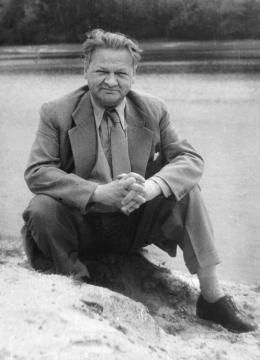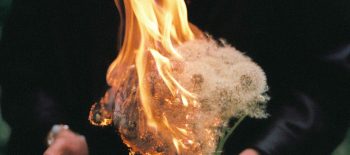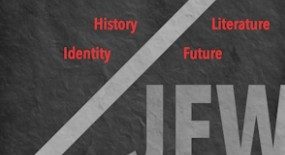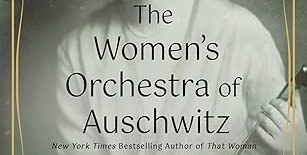Władysław Broniewski – the Poet for the People
Polish Poetry Unites is a video series for anyone interested in literature, history and reading. In each episode Edward Hirsch, a distinguished American poet, and the president of the Guggenheim Memorial Foundation, will introduce a celebrated Polish poet to American audiences.
This episode of Polish Poetry Unites introduces the work of Władysław Broniewski to American audiences. Władysław Broniewski was born in Płock in 1897 and died in Warsaw in 1962. He was a Polish poet, writer, translator and soldier. Known for his revolutionary and patriotic writings.
Following the exploration of Broniewski’s life and poetry by Edward Hirsch (more below) the video showcases the story of Jerzy Piątek, a fisherman from Sopot, Poland, who presents his favorite poem by Broniewski” Ballads and Romances.” (The poem was translated from the Polish by Joanna T. Huss.)
In the video Edward Hirsch says: “Broniewski is a remarkable figure born in 1897 he died in 1962. Like all Polish poets who lived through this era he had tremendous issues to deal with historically. He was a Polish patriot for sure, who fought for Polish independence. He was a tremendous soldier really, a kind of warrior, a remarkably gifted poet.
He was part of the Skamander group, which really prized technical skill, the sanctity of rhyme and rhythm. He was formally conservative and very gifted at traditional forms.
Politically he was very sympathetic to the proletariat, he was a leftist. He never joined the Communist Party, but he shared some of their values. At first, he was arrested by the Soviets and then later praised by them, so it’s a bit complicated in terms of his history.
The thing I like most about him is his sympathy for people on the outside, the underdogs, people who are kind of lost and he’s got tremendous sort of feeling for these outsiders.
To me his greatest work is a cycle of poems that he wrote about his daughter Anka. It’s very moving, his daughter died, and he wrote about her in a beautiful way.
He wrote an infamous poem, in praise of Stalin. Although perhaps you can’t blame him because many others did too. But he was lauded by the authorities, and this gave him a certain kind of sanction in his really uplifting of ordinary people.
In the poem “Ballads and Romances” which is a great Holocaust poem, the title comes from Mickiewicz, which is not accidental. I think he’s linking his hatred of antisemitism with the greatest national poet of Poland, which is to say antisemitism is unworthy of us. In the poem the Poles all help– a Jewish girl is killed by the Nazis, and she’s associated with Christ, and the Poles in the poem all help the Jewish girl and the Germans are killing her. I mean you can decide for yourself if that’s historically accurate, I tend to think it’s not, it’s sentimental. But it’s also his feeling for the Jewish girl is true and authentic and connecting her to Christ is really moving.
Ballads and Romances
“Listen, young maiden! But she’s not listening…
Broad daylight, small town…”
Not a living soul left, the town is gone
A red-haired child, Ryfka in her thirteenth year
runs naked through the rubble.
Hefty Germans drove in, in hefty tanks
(Run, Ryfka, run, run, Ryfka, run)
“Mom is under the rubble, Dad is in Majdanek, …”
she smiles, turns around, and is gone.
A good man she knew drove by from Lubartów:
“Ryfka, take this roll, it’d be good for you.”
She took a bite, flashed a smile and said,
“I will take it to mom and dad.”
A farmer drove by and tossed her some money.
An old woman gave her a little something.
Many folk drove by in droves
wondering why she was red and had no clothes.
Lord Jesus drove by wracked with pain.
The S.S. were leading him to his death.
They brought the two of them to the edge of the plain,
and aimed their guns at them.
Listen Jesus, listen Ryfka, Sie Juden, you Jews,
for your crown of thorns, for your red hair
for your nakedness, for our guilt
both of you shall now be killed.
A “Hallelujah” sounded in Galilee
and the two turned angels in turn
a silent salvo resounded then
“Listen young maiden!… But she’s not listening…”
Translated from the Polish by Joanna Trzeciak -Huss
Ballady i romanse
Słuchaj, dzieweczko! Ona nie słucha…
To dzień biały, to miasteczko…”
Nie ma miasteczka, nie ma żywego ducha,
po gruzach biega naga, ruda Ryfka,
trzynastoletnie dziecko.
Przejeżdżali grubi Niemcy w grubym tanku.
(Uciekaj, uciekaj, Ryfka!)
„Mama pod gruzami, tata w Majdanku…”
Roześmiała się, zakręciła się, znikła.
I przejeżdżał znajomy, dobry łyk z Lubartowa:
„Masz, Ryfka, bułkę, żebyś była zdrowa…”
Wzięła, ugryzła, zaświeciła zębami:
„Ja zaniosę tacie i mamie”.
Przejeżdżał chłop, rzucił grosik,
przejeżdżała baba, też dała cosik,
przejeżdżało dużo, dużo luda,
każdy się dziwił, że goła i ruda.
I przejeżdżał bolejący Pan Jezus,
SS-mani go wiedli na męki,
postawili ich oboje pod miedzą,
potem wzięli karabiny do ręki.
„Słuchaj, Jezu, słuchaj, Ryfka, sie Juden,
za koronę cierniową, za te włosy rude,
za to, żeście nadzy, za to, żeśmy winni,
obejeście umrzeć powinni”.
I ozwało się Alleluja w Galilei,
i oboje anieleli po kolei,
potem salwa rozległa się głucha…
„Słuchaj, dzieweczko!… Ona nie słucha.

Władysław Broniewski (born December 17, 1897, Płock, Poland, Russian Empire [now in Poland]—died February 10, 1962, Warsaw, Poland) was a Polish poet of exceptional emotional power and impact.
Broniewski, born into the intelligentsia, left high school in 1915 to join the Polish legions under the command of Józef Piłsudski, and he fought in the front lines. He was interned by the Germans in 1917 and released when Poland regained independence in 1918. As an army officer he fought with distinction in the Russo-Polish War of 1919–20. When he returned to civilian life, he joined the staff of a literary weekly, Wiadomości Literackie, in which he began publishing his revolutionary poems. Broniewski’s first volume, Wiatraki (1925; “The Windmills”), was followed the same year by a manifesto of “proletarian poets,” Trzy salwy (“Three Salvos,” written together with S.R. Stande and W. Wandurski).
Although he was never a member of the Communist Party, Broniewski was closely associated with the political left. Upon the outbreak of World War II, he was in eastern Poland, then under Soviet occupation, and he was promptly imprisoned for his independent views. Released in 1941, he joined the Polish forces under Brigadier General Władysław Anders, with whom he left the Soviet Union for the Middle East. There he published his collections of war poems, Bagnet na broń (1943; “Bayonets Ready”) and Drzewo rozpaczające (1945; “The Despairing Three”). In 1945 he returned to Poland, where he was welcomed as a prodigal son. He wrote profusely in the postwar years, including a poem, Słowo o Stalinie (1949; “The Word on Stalin”), that hailed the Soviet dictator, as well as the lyrical Mazowsze (1951; “Masovia”) and Wisła (1953; “Vistula”). A cycle of profoundly tragic poems, Anka (1956; “Annie”), was written after his daughter’s death.
“The simplicity of Broniewski’s verse, combined with its revolutionary rhetoric and lyrical overtones, made his poetry highly popular not only with literary critics but also with the Polish people, who found in him a spokesman for many of their social problems and patriotic feelings.” – Jerzy R. Krzyzanowski
(Source – Britannica)
The POLISH POETRY UNITES episode about Wladyslaw Broniewski was produced with additional support from: the Museum of Literature in Warsaw and New York Women in Film & Television
Lead image: Władysław Broniewski in Płock, cathedral in the background, photo: Henryk Hermanowicz / Władysław Broniewski Museum
Bio image: Władysław Broniewski, fot. Muzeum Władysława Broniewskiego
Moderator: Edward Hirsch
Writer and Director: Ewa Zadrzyńska
Cinematography: Jacek Mierosławski and Mila Antoniszczak
Editor: Anna Jędrzejewska
Curator and Executive Producer: Bartek Remisko




